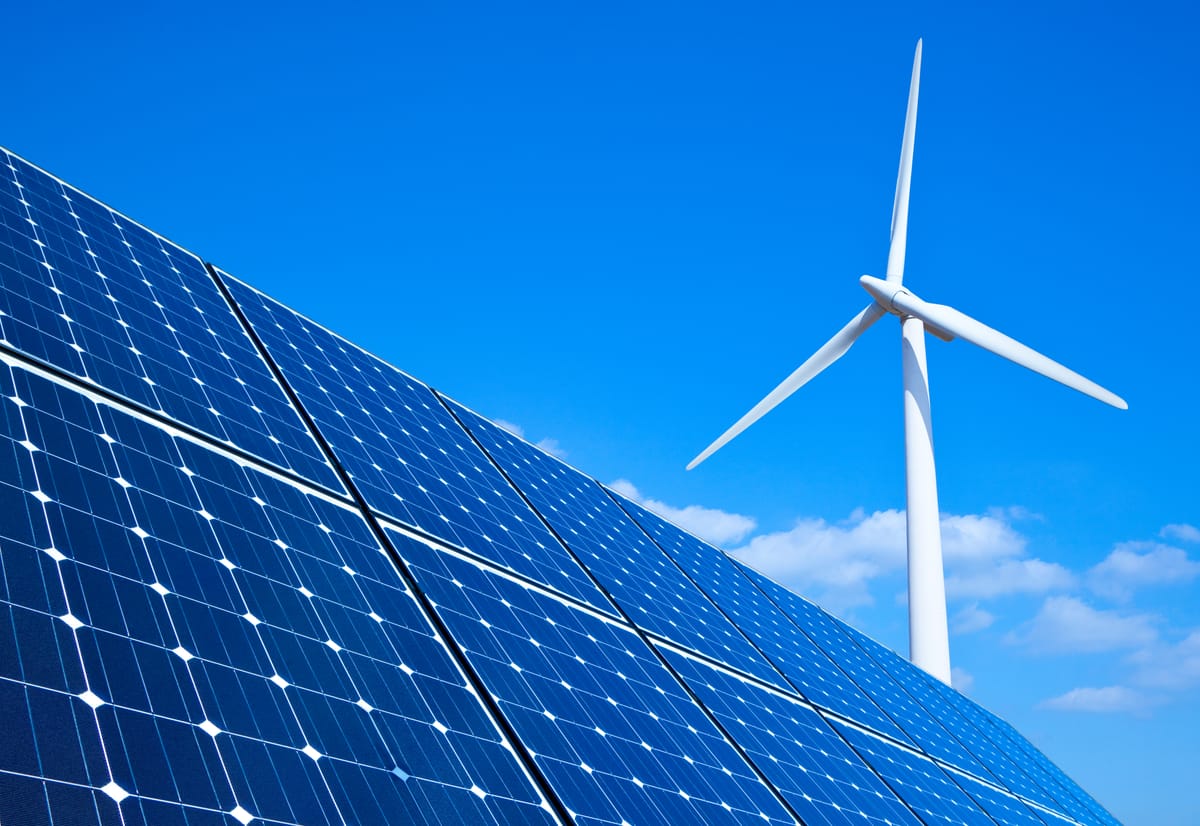This week, we're looking at record installation of renewable energy capacity worldwide, ongoing efforts to power Africa, and the use of AI to find critical minerals.
If you enjoy our Weekly Brief, please consider sharing it with your friends and colleagues in the climate community and encourage them to subscribe here. You can also follow Tectonic on LinkedIn and Instagram for more regular updates.
Scaling renewable energy: The installation of renewable energy worldwide reached a record high last year, with 92.5% of all new electricity coming from the sun, wind, or other clean sources, according to a report by the International Renewable Energy Agency (IRENA). China led the way in the worldwide renewable energy boom, accounting for nearly 64% of the new renewable electricity generated in 2024. The country added almost 3.7 gigawatts of renewable power, mostly from solar panels. The world added 5.85 gigawatts of new renewable electrical energy in 2024, a 15.1% jump from 2023, with 46% of the world's electricity now coming from solar, wind, and other green non-nuclear energy sources. Despite this significant growth, the world is still on pace to be 28% short of the international goal of tripling renewable energy from 2023 to 2030.
Powering a state capital with geothermal: The city of Boise, Idaho, has implemented a unique and environmentally friendly heating system, utilizing geothermal energy from hot water reservoirs, or aquifers, located deep beneath the ground to warm nearly 500 buildings, including homes, businesses, government buildings, and institutions. The geothermal system, which is the largest municipally run system in the country, draws hot water from wells in nearby foothills into a closed-loop network of pipes that distribute the heat throughout the buildings before returning the water to the aquifer to be heated again. Using geothermal heat has resulted in significant environmental benefits, including 6,500 fewer metric tons of carbon dioxide emissions annually, equivalent to removing 1,500 cars from the road each year.
Climate action can boost global GDP: The OECD and the UNDP released a study showing that ambitious climate action could boost global GDP by 0.2% by 2040 compared to current policies, equivalent to Sweden's economy. According to the study, well-designed climate policies can reduce emissions and enhance efficiency, productivity, and innovation, potentially leading to increased output. Investing in clean energy and efficiency can drive productivity and innovation, offsetting the economic impact of policy-driven price and consumption changes. The study also found that reinvesting carbon revenues could further boost GDP and build public backing for climate action. However, uncertainty could delay private investment and cut GDP by 0.75% as early as 2030.
Powering Africa: The mission to electrify Africa is underway with the rollout of mini-grids that generate electricity for small communities not connected to national supply networks spurred by plunging solar panel prices and international funding. The World Bank has launched a program called Mission 300, which aims to deliver power to 300 million Africans by 2030 and attract $85 billion or more of investment from governments and private investors. About 30 heads of state and governments attended a conference in January where a dozen nations presented detailed plans to achieve universal access to electricity. The Democratic Republic of Congo and Nigeria presented the biggest investment proposals, worth $35 billion and $27 billion, respectively.
Rivian announces small car spin-off: Rivian, a California-based EV maker, announced a new spinoff company called Also Inc., which will focus on building small, lightweight electric vehicles, with Rivian owning a substantial minority ownership stake in the company. The new company, billed as a micromobility startup, will be headed by president Chris Yu, Rivian's former VP of future programs, with an initial investment of $105 million from the venture capital firm Eclipse. Also Inc. plans to announce its flagship product this fall and begin deliveries in the US in 2026, followed by expansions into Europe, Asia, and South America, with its technology platform applicable to e-bikes and smaller three- and four-wheel vehicles, like neighborhood EVs and micro cars.
Climate deal stays on track: The Indonesian government has confirmed that a $20 billion commitment from rich nations to help the country transition to cleaner energy sources remains despite the US exit from the agreement. The deal is part of the Just Energy Transition Partnerships, which included Vietnam and South Africa. According to the Coordinating Minister for Economic Affairs, the US exit from the Paris Agreement and the Just Energy Transition Partnerships does not reduce the commitment of the other nine partner countries, including Japan, the UK, France, Germany, Denmark, Norway, Italy, Canada, and the EU. The partner countries have secured $1 billion in guarantees through multilateral development banks, and 54 green transition projects have received international funding commitments worth $1.1 billion in the form of loans, equity, or grants, with projects including the Muara Laboh geothermal power plant, the early retirement of the Cirebon coal plant, and a proposed waste-to-energy project in West Java.
Explore ways we can work together.
Tariffs could boost Canada's green sectors: The trade war between the US and Canada poses a threat to decarbonization efforts in both countries, but it may also create opportunities for Canada's green industries, such as electric vehicles, due to the country's abundant clean power and supply of critical minerals. Canada's clean aluminum and steel production could benefit from new markets and policies, including the EU's carbon border adjustment mechanism, which could reward sustainable producers and give Canada a competitive edge. The tariffs on auto imports could raise prices more for traditional gasoline-burning vehicles than electric vehicles, providing a competitive advantage to EVs that contain fewer border-crossing parts.
Judge rules against sale of oil drilling rights: A federal district judge has ruled against the Biden administration's sale of oil and gas drilling rights in the Gulf of Mexico, citing the Interior Department's flawed analysis of the sale's potential effects on the climate and endangered whales. The sale, which the Inflation Reduction Act mandated, made 73.3 million acres available and generated $250.6 million for the government, with 32 companies, including Chevron USA, Inc., participating in the auction and purchasing 299 leases.
AI company finds critical minerals: Earth AI, a mining startup, has discovered promising deposits of critical minerals in parts of Australia that other mining outfits had ignored for decades, using its algorithms to scan wide areas quickly and efficiently to find deposits that might have been overlooked. The company has identified deposits of copper, cobalt, and gold in the Northern Territory and silver, molybdenum, and tin at another site in New South Wales, 310 miles northwest of Sydney. Earth AI's algorithms were trained on a large dataset of mining exploration data from the Australian government, which has been collecting data since the 1970s. The company has raised a $20 million Series B and was part of Y Combinator's spring 2019 cohort. It is now working to prove that its technology can be used to find significant mineral deposits, which could have a major impact on the mining industry.
Deep sea mining company seeks support: The mining company, Metals Company, is seeking support from the Trump administration to bypass the International Seabed Authority and gain access to seabed metals in international waters, which could potentially harm the oceans and is a cause of concern for environmentalists and some countries. The International Seabed Authority, established 30 years ago by a United Nations agreement ratified by over 160 nations, has jurisdiction over seabed mining in international waters and has been slowly crafting mining regulations. The Metals Company plans to submit an application to the United States for a license to start mining as soon as 2027 and would use a giant vacuum-cleaner-like machine to extract metals from the ocean floor.


